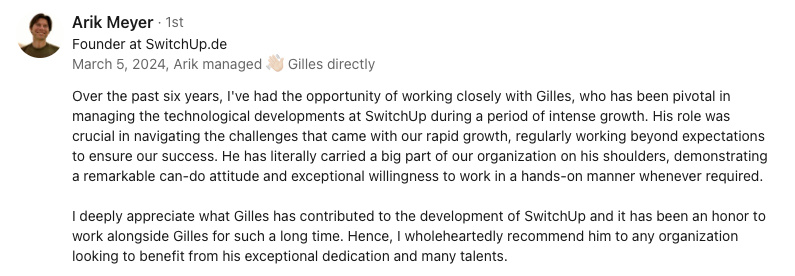Abstract:
The article emphasizes the importance of navigating Europe's stringent data protection regulations, particularly the GDPR, for startups aiming to succeed in the tech sector. It argues that compliance should be viewed not merely as a legal requirement but as a strategic advantage that can build trust with users and investors. By integrating GDPR principles into their operations, startups can enhance their credibility and open doors to growth and innovation. The use of technologies like Python plays a crucial role in this process, offering tools such as Pandas and PyPDF2 to automate compliance tasks and improve data security. Real-world examples from companies like Zalando, TransferWise, and Deliveroo illustrate how Python can facilitate compliance and security, turning regulatory challenges into opportunities for efficiency and advancement. The article suggests that embracing a security-first mindset and integrating compliance into the core business strategy are essential for startups to thrive in Europe's competitive market.
Navigating any startup through Europe's regulations can be tricky. The GDPR, in particular, feels like a tough puzzle, especially when you're juggling limited resources and big dreams. But it's important. Understanding and following these rules helps you avoid fines and builds trust with users and investors, which is vital in the tech world.
Success isn't just about having a groundbreaking idea; it's also about ensuring everything is compliant and secure. This article looks at how startups can use compliance as a strategic advantage, utilizing tools like Python to simplify processes and improve data security. By tackling these challenges head-on, startups can turn obstacles into opportunities for growth and innovation. Whether you're a seasoned entrepreneur or a newcomer, getting to grips with Europe's regulatory environment is key to long-term success. Let's see how you can navigate these challenges with confidence and a bit of creativity.
Navigating the regulatory maze in Europe
Understanding Europe's regulatory terrain
Europe is known for its strict data protection laws, especially the GDPR. This sets high standards for data privacy, requiring startups to meet complex compliance requirements. Understanding the details of GDPR is essential. It helps startups operate legally and stay competitive. These rules highlight the importance of protecting user data to build trust and attract investment, which is crucial for any new company aiming to succeed in Europe's tech scene.
Startups need to navigate these regulations skillfully to gain strategic benefits. Compliance isn't just a box to tick; it's a way to secure funding and maintain a competitive edge. By following GDPR rules, startups can build trust with both consumers and investors, ensuring their place in a crowded market. Embracing these regulatory challenges can boost business credibility, making it an essential part of their strategy.
Moreover, GDPR compliance offers startups advantages beyond legal obligations. It opens doors to growth and wider market access. Startups that incorporate GDPR principles into their operations can use compliance as a selling point, setting themselves apart in a competitive space. So, understanding and applying key GDPR requirements isn't just about staying legal—it's about seizing opportunities to expand and innovate.
Essential GDPR obligations for startups
GDPR has specific obligations like data protection principles, rights for data subjects, and breach notification requirements. Startups must know these to stay compliant. But limited resources and expertise often make this challenging.
For many startups, resource limits and expertise gaps make meeting GDPR standards tough. Yet overcoming these challenges can bring significant benefits. Navigating these hurdles often forces startups to streamline processes, driving efficiency and innovation.
Proper GDPR compliance doesn't just protect data; it can boost efficiency and spark innovation. By integrating compliance measures into their business models, startups can improve data management practices that protect user rights and drive success. This is where technology, including Python, plays a big role in automating compliance processes, paving the way for innovation and efficiency.
Python's role in ensuring compliance
Automating compliance with Python
Efficiency is a big benefit of automation, especially for startups dealing with complex compliance tasks. Python libraries like Pandas and PyPDF2 help a lot. Pandas is great for working with large datasets, simplifying data analysis and compliance checks. PyPDF2 automates document handling, easing the load of managing compliance documents. Using these libraries, startups can cut down on manual data processing, making compliance less daunting.
Plus, Python's flexibility lets startups innovate while staying compliant. Startups often face resource constraints, and Python allows them to tailor solutions to their needs. This adaptability is crucial, enabling tech-savvy entrepreneurs to develop efficient, cost-effective compliance mechanisms, reducing operational burdens.
Python's adaptability also means it can handle changing regulations. As new compliance demands arise, Python offers customizable solutions. For instance, tools like Apache Airflow automate reporting and streamline data workflows, helping startups meet regulatory deadlines easily. This adaptability fosters a forward-thinking approach, keeping companies agile amid regulatory changes.
Python libraries and frameworks for compliance
Security is critical for compliance, with libraries like Cryptography providing vital encryption tools. Let's look at some essential libraries:
- Pandas: Crucial for data manipulation and analysis, Pandas supports compliance by managing large datasets efficiently. It simplifies data handling, helping startups meet stringent compliance needs without much manual work.
- PyPDF2: A key tool for document management, automating the extraction and handling of compliance documents. It makes managing data retention schedules under regulations like GDPR easier.
- Cryptography: Offers strong encryption and decryption support, protecting data and ensuring compliance with data protection standards.
- Django: Provides comprehensive security features for web applications, with built-in tools for user authentication and data protection, helping web apps meet regulatory compliance easily.
Beyond individual libraries, Python enhances overall data security through its vast ecosystem. By integrating these tools into workflows, startups can bolster data security measures, ensuring operations remain compliant and secure in a demanding regulatory environment.
Enhancing data security with Python
Encryption and secure communication
Data security is a big concern for businesses, and for startups in Europe, it’s essential. Python's Cryptography library is a powerful tool here. It offers strong encryption features, essential for protecting sensitive data from unauthorized access. By using well-maintained encryption libraries, startups can ensure data security, minimizing risks and building trust with users.
Securing database connections is also key, and Python's SQLAlchemy is helpful. It supports complex database operations and ensures secure interactions through SSL/TLS protocols. Imagine your startup handling user data across various databases. SQLAlchemy helps maintain data integrity and protection, safeguarding against breaches and ensuring only authorized access.
Python's ssl module is also crucial for enabling secure data communication channels. Using SSL/TLS protocols, it ensures all communication is encrypted, preventing interception by malicious actors. Protecting data in transit is as vital as locking your front door. By leveraging Python for secure communication, startups can maintain confidentiality and protect sensitive information as it moves across networks.
Implementing secure coding practices
To protect sensitive data effectively, secure coding practices are a must. This includes input validation, secure authentication, and data encryption. Libraries like bcrypt and Cryptography provide essential tools for encrypting data and ensuring secure user authentication. Here's a quick checklist for secure coding best practices:
- Input Validation: Validate and sanitize inputs to prevent injection attacks.
- Secure Authentication: Use strong authentication mechanisms like bcrypt.
- Data Encryption: Encrypt sensitive data using robust encryption libraries.
Developing these security measures is crucial, but regular security audits and ongoing developer education are equally important. Keeping the team updated on the latest security threats enhances overall security defense. In my experience, emphasizing security education and regular audits has been invaluable in maintaining a secure coding environment.
Integrating security into the DevOps process takes your startup's security to the next level. Tools like Bandit for security checks ensure security is a shared responsibility throughout the development lifecycle. Embedding security into DevOps practices strengthens security protocols and fosters a culture of vigilance and shared responsibility. As startups grow, this integration is crucial for maintaining strong security defenses and ensuring user trust.
Real-world success with Python in European startups
Zalando's compliance strategy
Zalando, a well-known name in European fashion, has set a benchmark in GDPR compliance using Python's capabilities. By leveraging libraries like Pandas and NumPy, Zalando efficiently manages data anonymization and processing, ensuring they meet GDPR requirements. Their data practices protect user privacy and show how Python can be a strong foundation for regulatory compliance. This approach allows them to meet regulatory demands while maintaining consumer trust and operational efficiency.
Zalando’s focus on thorough data management, with Python at its core, highlights the importance of a structured approach to compliance. By embedding Python into their data workflows, they streamline operations and safeguard sensitive information. This example shows how rigorous data management practices, aligned with technology like Python, can propel startups toward compliance success.
TransferWise's security and compliance
TransferWise, now known as Wise, offers another example of Python’s role in shaping secure financial systems. In financial transactions, security is key, and TransferWise effectively uses Python to meet these demands. The scalability of their systems, along with stringent security measures, highlights Python's utility in building robust platforms that comply with financial regulations.
Python’s library support, especially for real-time transaction monitoring, is crucial for TransferWise’s defense against fraud. This capability ensures compliance with financial regulations and helps detect and mitigate fraudulent activities efficiently. Transitioning from one success story to another, we see Python as a defender against financial risks, emphasizing its role in enhancing transaction security and integrity.
Deliveroo's data protection approach
Deliveroo's use of Python shows another side of compliance and data security. Through their backend services, Deliveroo uses Python to deploy data security protocols quickly, aligning operations with GDPR requirements. This allows Deliveroo to handle logistics and route optimization while maintaining strong security.
Deliveroo’s open documentation of their tech practices through blogs and podcasts provides a resource for others in the industry. By discussing how Python helps maintain data security and privacy, Deliveroo not only meets regulatory standards but also inspires other startups. These real-world examples highlight Python's strategic use, showing its versatility and effectiveness in navigating complex compliance challenges.
Streamlining operations through Python integration
Unlocking potential with Python integration
Incorporating Python into startups' tech stacks offers big benefits, especially in streamlining compliance and security processes. Python's libraries automate routine compliance tasks, making the job more efficient and adaptable to changing regulations. For example, libraries like Pandas and PyPDF2 simplify data analysis and document management, freeing up resources for strategic tasks. This automation enhances operational flexibility and ensures startups can adapt to regulations with less effort.
Python also excels in security enhancement. It integrates easily with existing security tools, strengthening a startup's defenses. According to insights from the SANS Institute, Python's compatibility with security frameworks boosts protective measures without slowing development. Balancing tech advances with strong security is crucial, a lesson Python's integration supports through its adaptable ecosystem.
Finding balance between development speed and security
Balancing rapid development with strong security is crucial for startups. A security-first mindset from the start ensures security is part of the process, not an afterthought. This approach protects against vulnerabilities. A security-first mindset helps embed practices like input validation and data encryption directly into development, supporting stable and secure applications.
Implementing CI/CD pipelines with built-in security checks is invaluable for maintaining this balance. These pipelines ensure code is tested for vulnerabilities before deployment, enabling fast yet secure development cycles. The success of CI/CD is clear from a cross-border e-commerce platform I worked on, where integrating security checks sped up deployment without compromising security. Using Python strategically not only aids rapid development but also ensures security remains a priority, allowing startups to scale confidently in a compliant, secure way.
Embracing compliance challenges can feel overwhelming, but it's crucial for building a trusted startup. The GDPR isn't just a hurdle; it's an opportunity to gain an edge in the European market. By using tools like Python, startups can turn regulations into a catalyst for innovation, efficiency, and security. Companies like Zalando, Wise, and Deliveroo show how effectively integrating compliance into a business model leads to success and builds trust with customers and investors.
You might be interested by these articles:
- Python and DevOps: A Guide to CI, Automation, and Roles
- Python for Enterprise Automation
- Leveraging Python in Modern Software Development





